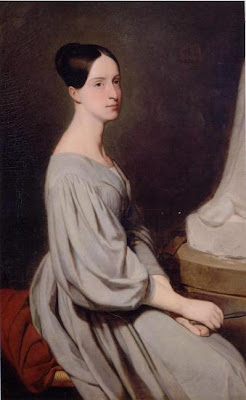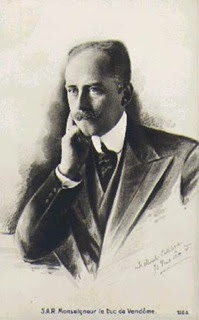I used to take a negative view of
Louis-Philippe, due mostly to his troubling taking of the throne from his cousins during the July Revolution of 1830. Amidst tumult and tragedy,
Charles X attempted to abdicate in
his grandson's favor and charged Louis-Philippe, as regent, to proclaim the little boy's accession. Ignoring these instructions, however, Louis-Philippe had himself proclaimed king in the child's place. I tended to dismiss him as a treacherous usurper, an unscrupulous villain.
Recently, however, I have been reconsidering this view. We do have to explain why
a noble, wise woman like
Marie-Amélie would love Louis-Philippe so deeply. From the beginning of their romance, she praised him in the highest terms, calling him good, virtuous, admirable, loyal, upright. We also have to explain why the Neapolitan sovereigns,
who had every reason to consider Louis-Philippe an enemy, allowed their daughter to marry him. They must have sensed goodness in the young man. The Queen, for her part, clasped his face between her hands and looked long and hard into his eyes. Finally, she told him she ought to detest him, as he had fought for republican France, but she could not help liking him. "Tell me the whole of your role in the Revolution," she stipulated, "I forgive all in advance, on condition of knowing all."
In tracing Marie-Amélie's life,
Princess Henriette of Belgium forcefully defends Louis-Philippe, whom she felt legitimists had treated unfairly. During the Bourbon Restoration, she contends, the Duc d'Orléans, who had loyally rallied to the idea of monarchy, sincerely desired to serve king and country, and could have been a splendid help to the royal family, had he not been constantly calumniated by their entourage. According to Henriette, Marie-Amélie suffered deeply from the incessant attacks on her husband, since she knew they were unjustified; Louis-Philippe may have been a liberal, he may have disagreed with the senior Bourbons, but he harbored no treacherous designs to foment revolution or usurp the throne. Henriette attributes such rumors to malicious attempts to sow the seeds of discord in the royal family. In 1830, she asserts, Louis-Philippe did not take the throne out of ambition, but out of a genuine concern to spare France the horrors of yet another revolution. The danger was that a regency of Louis-Philippe might be impossible, as the revolutionaries might not accept another descendant of the elder branch of the royal family as king.

Henriette's assessment of Louis-Philippe, as a man of integrity, courage and patriotism, coincides with the impressive testimonies of his wife, Marie-Amélie, and his eldest daughter,
Louise, Queen of the Belgians. Their letters are full of touching expressions of love, esteem and veneration for Louis-Philippe. Naturally, family loyalty is undoubtedly at work here (and even in Henriette's account), but nonetheless, these ladies were privileged witnesses. In 1848, after the February Revolution had driven the Orléans into exile, Marie-Amélie wrote sorrowfully to Louise: "(M)y heart breaks to think of the ingratitude and injustice of men. Your father was not ambitious for this slippery (throne). He had accepted it to save France from the misfortunes she is suffering from now. He had used it for these 18 years to render her happy and prosperous, amidst repeated attempts on his life and, at the end of all this, to reward his self-sacrifice, in his old age: calumny, exile, proscription, despoliation." In 1850, after Louis-Philippe's death in England, Louise, deeply afflicted by his loss and by the scornful criticism of the late king in the British press, wrote: "I have lost the best of Fathers and my consolation is that his end was painless, gentle, Christian, courageous, worthy of his life and of his heart, so great and so true, and- alas! - so little known."
I am no expert on Louis-Philippe, but I think that such deeply felt testimonies, coming from those who knew him best, ought to be taken seriously. This is not to say, though, that taking the throne from the legitimate heir did not disturb Marie-Amélie's conscience. Becoming queen was certainly a troubling tragedy for her, as I hope to explore further, in a final post on this remarkable lady.
(to be continued)
References:
La jeunesse de Marie-Amélie reine des Français, d'après son journal. 1935.
Le journal de Marie-Amélie, Duchesse d'Orléans:
1814-1822. 1938.
Kerckvoorde, Mia.
Louise d'Orléans, reine oubliée. 1991.
Lassère, Madeleine.
Louise reine des Belges: 1812-1850. 2006.


















